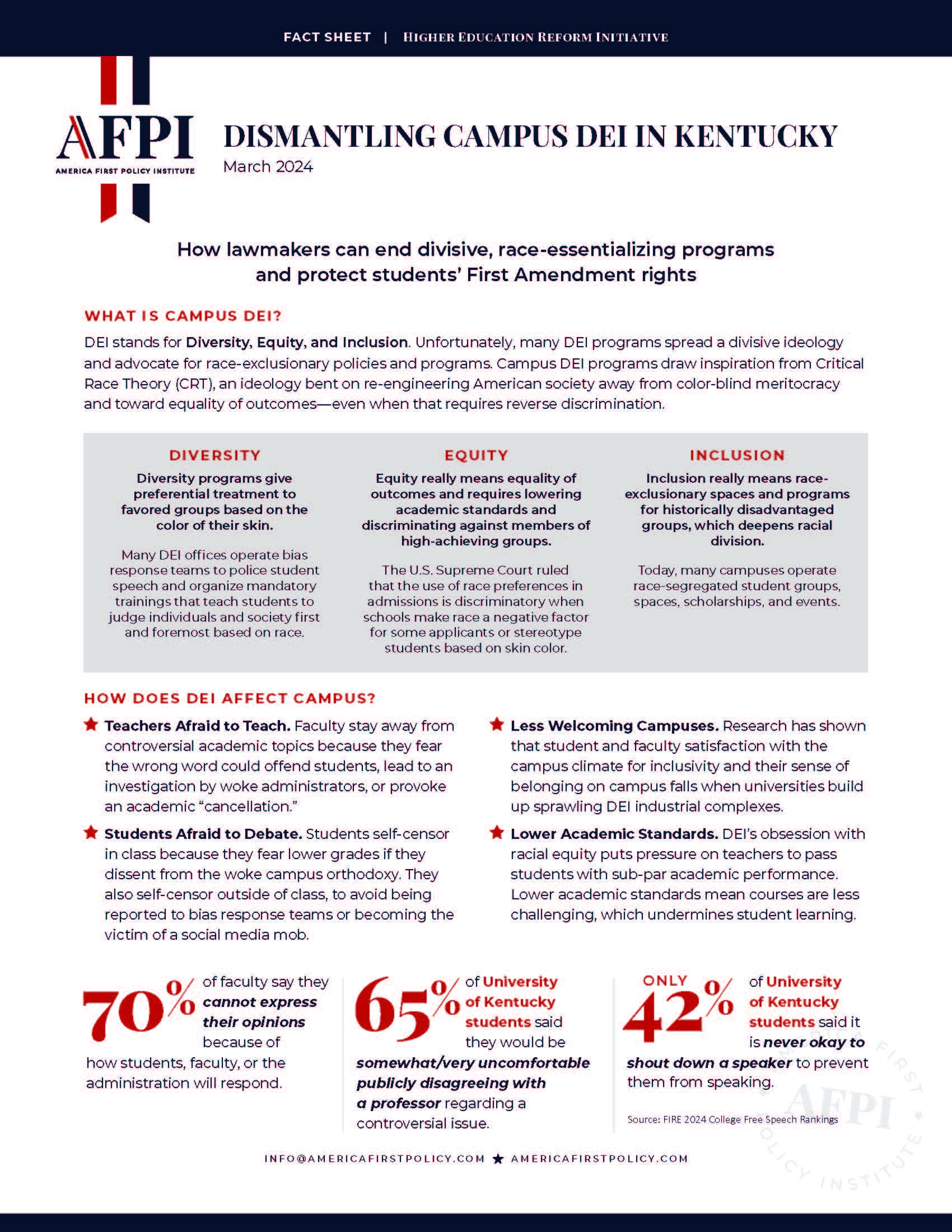Dismantling Campus DEI In Kentucky
How lawmakers can end divisive, race-essentializing programs and protect students’ First Amendment rights.
WHAT I S CAMPUS DEI?
DEI stands for Diversity, Equity, and Inclusion. Unfortunately, many DEI programs spread a divisive ideology and advocate for race-exclusionary policies and programs. Campus DEI programs draw inspiration from Critical Race Theory (CRT), an ideology bent on re-engineering American society away from color-blind meritocracy and toward equality of outcomes—even when that requires reverse discrimination.
DIVERSITY
Diversity programs give preferential treatment to favored groups based on the color of their skin.
Many DEI offices operate bias response teams to police student speech and organize mandatory trainings that teach students to judge individuals and society first and foremost based on race.
EQUITY
Equity really means equality of outcomes and requires lowering academic standards and discriminating against members of high-achieving groups.
The U.S. Supreme Court ruled that the use of race preferences in admissions is discriminatory when schools make race a negative factor for some applicants or stereotype students based on skin color.
INCLUSION
Inclusion really means raceexclusionary spaces and programs for historically disadvantaged groups, which deepens racial division.
Today, many campuses operate race-segregated student groups, spaces, scholarships, and events.
HOW DOES DEI AFFECT CAMPUS?
- Teachers Afraid to Teach. Faculty stay away from controversial academic topics because they fear the wrong word could offend students, lead to an investigation by woke administrators, or provoke an academic “cancellation.”
- Students Afraid to Debate. Students self-censor in class because they fear lower grades if they dissent from the woke campus orthodoxy. They also self-censor outside of class, to avoid being reported to bias response teams or becoming the victim of a social media mob.
- Less Welcoming Campuses. Research has shown that student and faculty satisfaction with the campus climate for inclusivity and their sense of belonging on campus falls when universities build up sprawling DEI industrial complexes.
- Lower Academic Standards. DEI’s obsession with racial equity puts pressure on teachers to pass students with sub-par academic performance. Lower academic standards mean courses are less challenging, which undermines student learning.
70% of faculty say they cannot express their opinions because of how students, faculty, or the administration will respond.
65% of University of Kentucky students said they would be somewhat/very uncomfortable publicly disagreeing with a professor regarding a controversial issue.
Only 42% of University of Kentucky students said it is never okay to shut down a speaker to prevent them from speaking.
AFPI REVIEWED STATE UNIVERSITIES IN KENTUCKY. WE FOUND DEI IN
- The core curriculum
- Bias incident reporting systems
- The faculty hiring process
- Race-exclusionary clubs
- Student orientation (first year seminar) materials
- Executive-level administrative offices
- Staff training and faculty training
- Course syllabi requirements
AFPI’s new research report, Reversing the Woke Takeover of Higher Education: Strategies to Dismantle Campus DEI, details seven recommendations for lawmakers and governors to restrict campus DEI, strengthen free inquiry, and improve viewpoint diversity at state universities.
Recommendation 1
State leaders can make information requests regarding DEI programs, personnel, and expenditures at public colleges and universities. The reports paint a clear picture of the extent to which DEI has infiltrated state universities and can inform legislation that would roll back excesses.
Recommendation 2
Lawmakers can publicly acknowledge that academic freedom and norms of shared governance protect academic debate about critical theory while opposing the use of universities as an instrument to advance CRT’s radical social and political agendas.
Recommendation 3
Legislation addressing DEI at public universities should be carefully targeted. Lawmakers should end the use of DEI statements in hiring decisions, mandatory training that spreads a divisive ideology, and bias incident reporting systems. They can also defund DEI offices that sit outside of the academic structure of the university.
Recommendation 4
Public universities can be required to articulate a commitment to free expression and institutional viewpoint neutrality in the university’s mission statement, governing bylaws, and policies on academic freedom.
Recommendation 5
Governors should appoint governing board members who have the expertise and fortitude to lead. In addition to a commitment to the truth-seeking mission of the universities, governors should appoint individuals who understand higher education finance, law, fundraising, and governance.
Recommendation 6
States can adopt legislation strengthening free speech protections for students and faculty and encouraging viewpoint diversity. To learn more, please download AFPI’s inventory of model legislation.
Recommendation 7
Public leaders can urge state universities to invest in race-neutral programs and develop evidence-based practices that truly support student success, irrespective of a student’s demographic background.
To learn more, please contact the Higher Education Reform Initiative at AFPI.
Jonathan Pidluzny, Ph.D., is the Director of the Higher Education Reform Initiative at the America First Policy Institute.
Previously he was an associate professor of political science at Morehead State University.
EMAIL: [email protected]
Matthew Lobel is the Policy Analyst for the Higher Education Reform Initiative at the America First Policy Institute.
EMAIL: [email protected]
